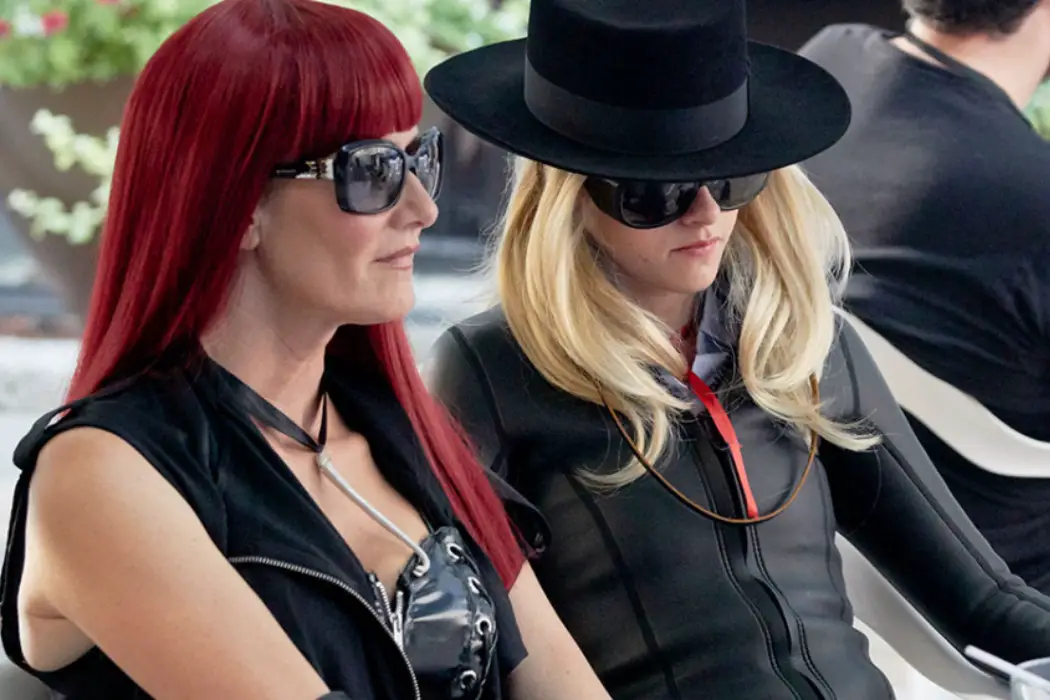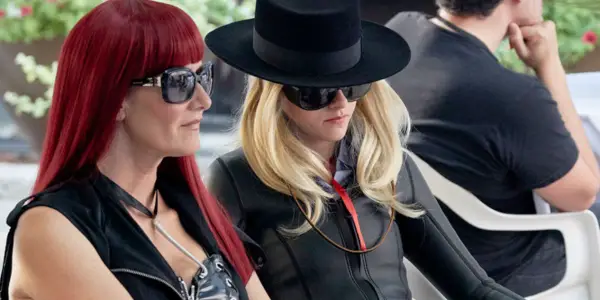BFI Flare Film Festival 2019: Exploring Identities

Becky spends her days working in TV and she spends…
Moving on from the first dispatch from BFI Flare Film Festival 2019 (which you can read here if you missed it), a great many of the films screening this year had a renewed focus on identity. The way we identify ourselves, the way we form communities based on identification and the idea of identity shifts and fluctuates depending on the storyteller and narrative.
Closing film JT Leroy (Justin Kelly), Floriane Devigne‘s documentary No Box for Me, An Intersex Story and Two in the Bush: A Love Story (Laura Madalinski) all dip into the idea of identity in varying ways. More below…
JT Leroy (Justin Kelly)

Literary personas are commonplace, but the story of Laura Albert, Savannah Knoop and the mythical JT Leroy is anything but. In 2000, Laura Albert published her debut novel Sarah under the pen name of JT Leroy, and claimed the book was based on the authors own childhood experiences of poverty, abuse and prostitution.
For several years, Albert (Laura Dern) communicated with the press as JT Leroy only via phone – explaining the lack of public appearances due to debilitating shyness. This is where Justin Kelly’s Jeremiah Terminator Leroy begins its version of the events which followed. Sister-in-law of Albert, Savannah Knoop (Kristen Stewart) moves in with her brother Geoffrey, (Jim Sturgess) and Albert herself, and the two women quickly become embroiled in one of the most intriguing literary scandals of the 21st century.
The narrative itself takes great liberties with the original story. It’s worth noting that the film is actually based on Savannah Knoop’s autobiography Girl Boy Girl: How I Became JT Leroy, and Knoop herself co-wrote the films script. Much like Bohemian Rhapsody, which was executive produced by remaining band members, the story favours Knoop over Albert and allows the audience into Knoop’s life in a far more intimate way. Albert occasionally comes across as more of a caricature than a real person which is comical in places but also serves to undermine Albert’s own insecurities which are seen as a punchline rather than investigated.
Stewart utilises her own aversion to the media spotlight and channels this towards the character of JT. The whole thing feels self-reflective; the persona of JT, like Stewart, dislikes public appearances and is also notoriously shy. Knoop, on the other hand, is portrayed as quietly confident – her insecurities mostly hinge on her own self-doubts about playing JT. Stewart straddles the two roles with ease.
Despite captivating performances from both Dern and Stewart, Jeremiah Terminator Leroy never manages to break out of the drudgery of a standard biopic. There’s a sense that the cast are itching to do more but are constrained by the rigid dialogue and repetitive scenarios of Laura and Savannah. These are two actors at the very top of their respective games – two of the most engaging people to watch onscreen but Jeremiah Terminator Leroy stifles them.
Similarly, Diane Kruger as JT’s part-time lover and film director Eva is as good as can be expected – like Dern and Stewart she does as much as she can with what little is offered. Eva ends up being a stereotype rather than a fully fleshed out character – she’s the over dramatic actor-turned-director who regards JT as a springboard for her career. This is not necessarily an issue, but the relationship between Knoop as JT and Eva feels incredibly forced because it’s clear from the start what Eva wants to get out of it.
The argument around faked identities or personas are a murky, grey area – Albert’s speech at the very end of the film investigates the idea of feeling like we belong in the brain or body different from what we are born with. To the films credit, director Kelly doesn’t fall down hard on either side of the argument. Rather, he creates an interesting dialogue surrounding how stories are more accessible or easier to digest when they come from a certain voice or platform. Would Laura Albert have been successful as Laura Albert instead of as JT Leroy. Again, this isn’t a question that Kelly attempts to answer, instead exploring the avenues that branch off from this line of thinking. Is there a deceit happening here? Does it matter if what we are reading is real or fake, or does it only matter if it’s been sold as reality?
No Box For Me, An Intersex Story (Floriane Devigne)

The I of the LGBTQI+ anagram is the letter perhaps most often missed, overlooked or sorely misunderstood. There is a constant fluctuation regarding which identities and sexualities the umbrella acronym encompasses, but intersex is definitively the least discussed. To be intersex – to be born without enough genital distinction to be categorically placed as either a boy or a girl – is something which affects an estimated 0.5% to 1.7% of the population. The scope within the percentage affected is skewed even then, as doctors cannot come to any sort of conclusion on what the boundaries of being intersex are. Intersex babies are more often than not treated as an issue to be solved, a defect to be rectified so that a child can grow up within a defined gender. The process is not always simple, and as explored in No Box For Me, An Intersex Story, directed by Floriane Devigne.
Devigne has clearly cultivated a close relationship with the Intersex’s main subject, Deborah. It is Deborah’s voice which guides the documentary; she speaks to other intersex people online, swaps childhood stories over a pint and reveals her secret to her sister. The level access here is integral to telling the subjects stories so effectively and Devigne is given an extraordinary amount of trust to do this.
Devigne uses both interviews and imaginative animation to explore the idea of identity. One of her subjects, M, does not appear on camera – instead her hands and face are coloured out and only her silhouette is really visible. M talks at length about her confusion surrounding her own identity, her struggle to rectify her mind with her body and the traumas of being different to the idealised versions of the two binary genders. Devigne utilises the lack of image (the shower scene is particularly poignant) to allow her audience to really identify with M’s pain rather than just hear about it.
At a short 60 minutes, No Box for Me doesn’t overstay its welcome. It may even have benefited from being slightly longer, setting aside more time to get to know its subjects. Devigne’s film feels swift as opposed to rushed and a few extra minutes with Deborah, an effortlessly engaging and charming character, would have been welcomed.
Not only is No Box For Me delightfully creative, it is full of information and is therefore easily accessible for both people who understand the concept of being intersex through to those who have may never even heard the term before. There is much to be rectified with the treatment of intersex people (in the medical profession and within society) and No Box for Me feels like a huge step in giving a platform to those stigmatised.
Two in the Bush: A Love Story (Laura Madalinski)

Reminiscent of Desiree Akhaven’s recent UK TV series, The Bisexual which also explores a post-breakup experimentation with new ideas about relationships, identities and finding oneself, Two in the Bush is rom-com with a twist. Both Two in the Bush and The Bisexual mix comedy with deeply emotional moments. The result is highly relatable content which one can identify with whilst laughing at how ridiculous humans can be, specifically when dealing with love.
Two in the Bush follows the formula of so many break-up rom-coms which usually end with the protagonist starting to accept her new situation, often with the beginnings of a new relationship on the horizon. Protagonist Emily (Sarah Mitchell) has her cosy life with girlfriend Kate (Adriana Leonard) abruptly shattered when she comes home early one day to find Kate in bed with a man. She moves out to live with best friend Rosa which is initially a temporary move but on losing her job as film directors assistant, Emily becomes a permanent feature on Rosa’s couch. A new job and the potential for two new relationships enter Emily’s life, but is she ready for a poly-amorous relationship?
Mitchell’s Emily is your every-girl. She’s lost, alone and not sure where to go from here. A new job at a BDSM studio gets her out of the house but then lands her in a different yet equally challenging scenario. She begins dating her boss, Nicki (Caitlin Aase), then ends up falling for Ben (Travis Delgado) but then discovers that the might be part of their their open relationship. Madalinski expertly navigates the world of poly relationships from an outsiders perspective. Emily may be engaged in this three-way soiree but she is a newcomer to this world. Treated with tact and sensitivity, new concepts are explained and ground rules are set out. Two in the Bush is Emily’s journey but it doesn’t judge and it doesn’t presume.
Two in the Bush also very funny – the dating montage rivals some of the best rom-com’s out there (including Aziz Ansari‘s in Master of None) and Madalinski, with writer Kelly Haas, play with some hilarious ideas here (not sure whether multiple gagging cats or Uncle Jerry is worse, to be honest).
Yet, a lack of access into Emily’s inner thoughts prevents a real engagement with her. Emily’s motivations often spring out of thin air and there seems to be little consistency in her desires. Everything about her we are told by someone else – Rosa (who deserved far more screen-time), Nikki or Ben. Emily remains just out of reach at all times, especially at the end when she seems to achieve everything she has set her heart on.
For a film which, prior to this, felt grounded in reality, the fantasy ending seems way too idealistic. There’s also no sense that Emily has learnt anything from her experiences – she turns away from both her career and relationship only to have them handed back to her on a plate. Emily’s directorial debut doc (screened at the end) also drops in a burning desire to promote sex workers rights which (whilst admirable) seems to come out of absolutely nowhere. Two in the Bush is Madalinski’s first film and it’s clear that it has got potential. Sadly, Two in the Bush doesn’t execute a lot of the narrative plot points with conviction which leaves the film feeling slightly flat.
BFI Flare Film Festival (London’s LGBTQ+ film festival) is running from 21st to 31st March 2019. See here for the full programme.
Does content like this matter to you?
Become a Member and support film journalism. Unlock access to all of Film Inquiry`s great articles. Join a community of like-minded readers who are passionate about cinema - get access to our private members Network, give back to independent filmmakers, and more.
Becky spends her days working in TV and she spends every other minute writing about cinema, TV & feminism. Based in London, she also likes drinking gin, re-watching 'The X Files' and writing about on-screen representation and all manner of things over at femphile.com










